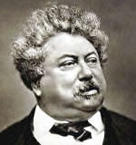
(Alexandre or Alejandro Dumas; Villers-Cotterêts, France, 1802 - Puys, id., 1870) French novelist. Son of a French army general who left his family practically in ruins when he died. Thanks to his position as a clerk for the Duke of Orléans, he managed to complete his training in a self-taught manner.
Since 1825, he edited poems and long stories, and represented vaudeville in variety theaters. But the true beginning of his career as a playwright came in 1829 with Henry III and his court, the first manifestation of the new romantic literary generation. Antony, in 1831, marked the beginning of a stage of indefatigable creation of dramas, tragedies and melodrams, almost all of exaltation of the national history of France. He also wrote historical novels and The Three Musketeers, in 1844, meant his rise to fame. Working with the help of several collaborators, among which the historian Auguste Maquet, with whom he worked from 1839 to 1851, stood out, he produced eighty novels of unequal quality. Most of them belong to the historical or adventure genre, in which the Count of Montecristo undoubtedly stands out.




